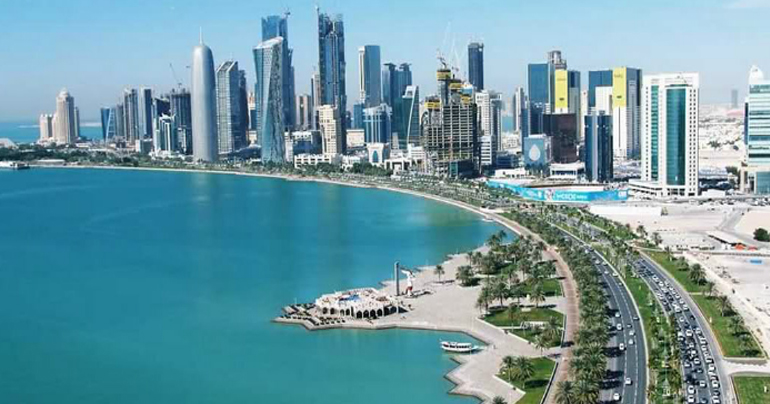
History and Transformation of Qatar
04 Nov 2016Before Qatar turned into an oil economy in 1940, Qatar consisted of little more than a few villages on the shoreline that were economically dependent on pearl fishing and nomadic cattle-breeding tribes. Under British “protection” status, the first political institutions and infrastructure were developed and literally fueled by hydrocarbon revenues. After the withdrawal of British forces in the late 1960s and early 1970s, the British “protected state” Qatar began negotiations with what is now the United Arab Emirates and Bahrain to form a federation. When these negotiations failed, Qatar decided to go its own way and declared independence on 1 September 1971. On 22 February 1972, Sheikh Khalifa Bin Hamad Al Thani became the Emir of Qatar by deposing his cousin. He ruled the country in an authoritarian fashion until he was overthrown by his son, Sheikh Hamad Bin Khalifa Al Thani in June 1995. He, in turn, voluntarily transferred his power to his son Tamim bin Hamad Al Thani on 25 June 2013. Compared to his predecessor, Emir Hamad Bin Khalifa has turned out to be more committed to an open society and the development of the country, and has proven essential to shaping its current form.
Just after taking office, Hamad introduced a series of reforms that have had lasting impact not only on the economic and political system of Qatar, but also on society in general. As a result, Qatar has been firmly put on the political map and its capital, Doha, has become a household name globally. Hamad introduced elections and a constitution, developed infrastructure, and invested heavily in healthcare and education. He abolished the Ministry of Information and created the al- Jazeera Satellite Channel network in 1996, which has since revolutionized mass media in the Arab world. Al-Jazeera has contributed to freedom of expression in the region by tackling many previously taboo subjects, and propelled the country onto the international scene. Qatar’s first- ever election, albeit at the local level, took place in 1999. The election to the Central Municipal Council (CMC) brought novel concepts and practices to Qatar, despite its conservative nature and the limited prerogatives of the institution. In a groundbreaking move – not only for Qatar, but also for the whole male-dominated Gulf region – women were allowed not just to vote but to run for election, which finally happened in 2003. One of the former emir’s three wives, Sheikha Moza Bint Nasser Al Misnad, is very active in politics and culture, and has been trying to implement the ruling family’s vision for the future development of Qatar. She co-founded and chairs a number of important organizations, including the Qatar Foundation, the leading Qatari umbrella organization for research, education and community development.
The adoption of Qatar’s permanent constitution in a public referendum in April 2003 with 98% approval represented a milestone in the reform process and brought about some modest improvements with regard to democratic ideals. While the constitution stipulates that rulers of Qatar should be from the Al Thani family and the position of the emir is not to be contested, it nonetheless officially provides basic rights and liberties for citizens. Also, it lays the ground for an – albeit underdeveloped – system of power sharing between the three traditional branches of government. Significantly, however, the constitution called for the creation of a partially elected parliament to replace the 35 appointed members of the current Advisory Council. However, elections were delayed multiple times and are not expected to take place until 2016.
Economically, Qataris have the highest per capita income in the world. Its enormous hydrocarbon rent income enabled the ruling family to establish a vast social welfare state without the need for taxation and its citizens enjoy a very high standard of living. However, this development was accompanied by the ever-rising import of cheap labor from foreign countries as Qataris were at first not able, and later unwilling, to perform the amount of demanding or degrading work necessary for such rapid progress. This led to Qataris becoming a highly privileged, but also tiny minority in their own country, constituting only about 12% of the population. Qatar’s economy is thus highly dependent on hydrocarbon exports and foreign labor, and is in need of diversification. The challenge now is to transform its mainly rent-based economy into a knowledge-based one and to Qatarize the workforce. Doha is already known as an economic and financial hub, Qatar Airways is one of the world’s leading airlines, and it is strategically located between the important markets of Europe and Southeast Asia.
Over the last decade, Qatar has positioned itself as a key power broker in the region, having successfully contributed to the resolution several regional conflicts. As a result, Qatar developed strong ties with both regional and international players. However, Qatar has also been subject to increasing criticism for its regional power and foreign policy activity in the wake of the Arab Spring, which includes the support of (violent and non-violent) Islamist groups in various Arab countries. Saudi Arabia in particular tried to dampen Qatar’s rise to regional power, culminating in the withdrawal of Saudi, Bahraini and Emirati diplomats from Doha in March 2014. Qatar’s activism significantly declined among rising domestic criticism since Emir Tamim came to power in 2013. Further pressure was put on the tiny country because of international attention surrounding FIFA’s decision to give Qatar the hosting rights to the World Cup in 2022 in December 2010. At the time, this was seen as a major victory – a signal that Qatar’s national branding and development were appreciated, which could be used as a catalyst for development. However, the tables turned on Qatar and the media attention was seized by human and labor rights groups who vocally decried the situation of foreign workers in the Gulf state. Also, more traditional sectors of society that do not support further political opening and economic liberalization saw the event as a further challenge to the country’s identity.
This tension reveals the dualism at play in Qatar in recent years: the pace of change has been too slow for some, while at the same time the country remains essentially a tribal society with an autocratic regime. Nonetheless, conservative elements see change as moving too fast and posing a threat to the traditional and Islamic nature of Qatar’s society.
Reference - BTI Report 2016
What people say

A business leader with a clear objective to Build a Legacy through his business acumen and passion to excel, being associated with Dr Tejinder opens up new avenues for learning.

Dr Tejinder Singh , the man who taught me to teach and lead. My first and only professional Guru who would run the mile first and push me to walk that . A wonderful human being and an exceptional professional.

Tejinder is one of the most amazing client/business partner that I have ever met.

I met Bhattia sahib once and found him very friendly,intelligent and very focused head of an efficient organisation.

In my association with Tejinder I have found him to be very frank in his views.He is very strong in his domain knowledge and also has sharp commercial acumen.

I was hired by Tejinder Sir, in the year 2003, which was also the turning point in my career.

My 1st Impression about Mr. Tejinder Singh Bhatia - An Exteremely Confident Professional, Who knows What he is Doing and Where he wants to Reach.

He was a dedicated and sincere person and always followed pragmatic approach while fulfilling his job responsilbilites.

I am priviledge to work under him, he is an excellent Leader where team always ready to work for him even at oddest hour of the day.